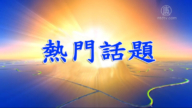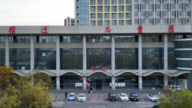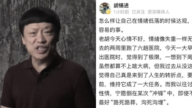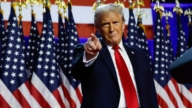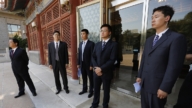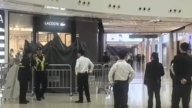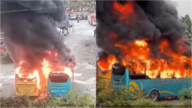【新唐人2011年12月17日讯】12月14号结束的北京“中央经济工作会议”提出,明年经济工作的总基调定为“稳中求进”,继续保持稳健货币和积极财政政策,宏观调控的顺序调整为“稳增长、控物价、调结构”。海内外专家解读,为确保明年中共十八大顺利召开,当局以“求稳”应对经济放缓和通货膨胀的双重压力。
在全球经济形势走低、欧美市场不振的背景下,中国经济正在遭遇多重困难,包括制造业萎缩、出口下滑、中小企业高利贷、地方政府巨额债务、房地产泡沫,以及高通胀等。
胡锦涛主持的“中央经济工作会议”承认,当前中国经济发展中,不平衡、不协调、不可持续的矛盾和问题仍很突出。当局希望阻止经济出现“硬着陆”,同时又试图避免通货膨胀引发社会动荡。
会议提出,“稳增长”就是扩大内需、稳定外需,“控物价”就是防止物价走势反弹。会议还强调要防范经济运行中的潜在风险。
“纽约城市大学”经济学教授陈志飞向《新唐人》表示,这次会议表明中国整个经济形势很不乐观。
陈志飞:“现在这个经济形势造成了经济放缓、通胀上升,还有国内内需下降,这些问题都不是党的政策马上解决的,需要中共当局特别小心,就像走钢丝的、非常要小心这种平衡的行动,所以它用的词就是‘稳健’或者是‘积极’这方面的。”
《路透社》援引经济学家分析指出,“稳中求进”表明政策会延用原来的路数,只是稳健货币政策在今年是稳中偏紧,明年会体现出稳中偏松,尤其会定向宽松。
中国货币供应量增速11月份降到10多年来最低水平。国务院发展研究中心金融所副所长巴曙松表示,2011年的稳健重点是为了抑制通胀,那么2012年的稳健可能更多强调维持经济的平稳增长,不出现大起大落。
北京经济学家冯兴元担忧当局的积极财政政策,又走回到“国进民退”的老路。
冯兴元:“增长率明年可能会有所下降,那么,政府所谓的积极财政政策可能也是跟这个有关。但是,这样一种通过政府消费投资来维持增长的话,它背后就会有一些问题,比如说‘国进民退’的问题,政府国有企业投资比较大的话,那么涉及到整个经济质量,经济结构的质量和经济的质量都会下降。”
“中央经济工作会议”提出,财政政策要继续结构性减税,促进经济结构调整,严格财政收支管理,加强地方政府债务管理。
今年中国财政收入将达到10万亿元,税收增幅约为GDP增幅的3倍。结果造成,中小企业不仅税负过重,而且资金链紧张甚至断裂,出现了中小企业倒闭潮,中国实体经济经营环境恶化。
冯兴元:“所以,我们真要改善经济结构的话,最重要的还是私人投资环境、私人企业的生存环境是不是恶化了,是不是改进了,这些因素很重要。”
中国(海南)改革发展研究院院长迟福林表示,目前,拉动消费、扩大内需是中国经济转型的首要任务。强调扩大内需、增加居民收入,关键是以收入分配为重点的改革突破。
“中央经济工作会议”提出,坚持房地产调控政策,促进房价合理回归。会议还指出,中国经济增长下行压力和物价上涨压力并存,经济金融等领域也存在潜在风险。
新唐人记者陈汉、李元翰、肖颜采访报导。
——————
China’s Economy Tone: Stability and Improvement
The Central Economic Work Conference (CEWC)
ended in Beijing on December 14.
It has proposed the overall tone of the economic work
next year to be “maintain stability and improvement,” continue the prudent monetary and active fiscal policies.
The macro-control order was adjusted to “steady growth,
prices control, and structure adjustment.”
Domestic and overseas experts think this is to ensure
the success of the 18th Congress Conference next year.
The Chinese authorities use “maintaining stability” to address
the dual pressure from economic slowdown and inflation.
In the decline of the global economy and sluggish U.S.
and European markets, China’s economy is also suffering.
It has many problems, like manufacturing and export decline,
SME loan sharks, huge local governments debt, real estate bubble and high inflation.
Hu Jintao presided over the conference.
He admitted that China’s current economic development
still has outstanding contradictions and problems that are unbalanced, uncoordinated and unsustainable.
The authorities want to stop the economy from “hard landing,”
and avoid social unrest due to inflation.
At the conference were discussed various economic issues.
For the “steady growth” it was decided
to expand domestic demand and stabilize external demand;
The handling of “prices control” issue
will require to prevent the price trend from rebounding.
The meeting also stressed about the need
to guard against potential risks in the economy.
Economics professor Chen Zhifei, City University of New York,
told NTD, the meeting did not show much optimism about the Chinese economy.
Prof. Chen: “The current economic situation is caused by
economic slowdown, inflation rise, domestic demand decline.
These problems can not be solved immediately
with the policies of the Chinese Communist Party (CCP).
The CCP needs to take special care. It is like walking
on a tightrope, it should be very mindful of the balance.
So it is with the use of the words “sound” or “positive”
in this area.”
Reuters quoted economists’ analyses, pointing out that,
“maintaining stability and improvement” policy shows they will continue to use the original rules.
However, the steady monetary policy is a little tight this year,
and will be loosened up next year, especially in some areas.
In November, China’s money supply growth
was at its lowest level for over 10 years.
Ba Shusong, deputy director of Finance in State Council
Development Research Center, said the 2011 focus is to curb inflation.
And that in 2012 the emphasis might be on stabilization,
to assure there are no big ups and downs in the economy.
Beijing economist Feng Xingyuan has concerns the proactive
fiscal policy might lead China back to the way, “Nation moves forward, people move backward.”
Feng Xingyuan: “The growth rate may decline next year.
The so-called active fiscal policy may also be linked to it.
Maintaining a growth with government consumption
and investment will cause some problems.
Like the say, “Nation moves forward, people move backward”.
If large amounts are invested in state-owned enterprises,
when it comes to the quality of the entire economy, the quality of the economic structure, they will both decline."
CEWC proposed the fiscal policy that China should continue
structural tax cuts to promote economic restructuring;
it should strengthen fiscal and expenditure management,
and local governments debt management.
China’s fiscal revenue this year will reach RMB 10 trillion;
the tax surpassed about 3 times the GDP growth.
Thus SMEs not only have heavy tax burden, but some even
ended up in closures, deteriorating the business environment of China’s real economy.
Feng Xingyuan: “So if we really are to improve the economic
structure, the most important thing is the private investment and the business environment of private enterprises.”
Chi Fulin, China Reform and Development Research Institute,
expressed concerns on the issue.
Chi said, the primary task of China’s economic transformation
is stimulating consumption and expanding domestic demand.
To expand domestic demand and increase income
breakthroughs in the income distribution reform are needed.
The CEWC proposed an adherence to the real estate
regulatory policies and promotion of reasonable price return.
The meeting also noted, the pressure of economy downward
and price rising co-exist, and there are potential risks in economic and financial areas.
NTD reporters Chen Han, Li Yuanhan and Xiao Yan


